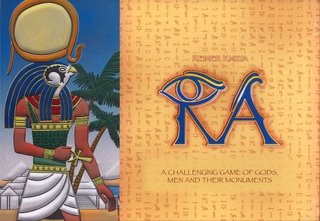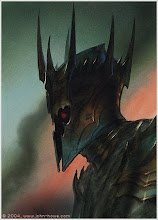Not Such a Ra Deal
 I got to play some Ra last Friday with two Johns and an Audrey (that's the name of my next film). And I must say I was quite impressed with the game. The little scoring mats that John (not Peterson), the owner of the game, had run color copies of, turned out to be so essential to my understanding of the game that I was disappointed to discover that the game did not come with any such instructional device. From what I understand, one must visit a website and download them. That's cool. I can hang.
I got to play some Ra last Friday with two Johns and an Audrey (that's the name of my next film). And I must say I was quite impressed with the game. The little scoring mats that John (not Peterson), the owner of the game, had run color copies of, turned out to be so essential to my understanding of the game that I was disappointed to discover that the game did not come with any such instructional device. From what I understand, one must visit a website and download them. That's cool. I can hang.How to describe this game... I guess I can start by saying that it is a Reiner Knizia game, and that in it you bid for resources (monuments, pharaohs, Nile tiles, civilizations, gods and gold). These tiles are put out randomly in a continuum on the main playing mat (ma'at?). Of course, a person could invoke 'Ra!' instead of drawing a tile which would start the bidding process for the resources already in play, or one could draw a Ra tile which would force that player to invoke Ra and start the bidding. The bidding is done by sun tiles (they are wooden and aesthetically pleasing) numbered from 1 to 15 (I believe), the higher number having priority. There are many strategies one could employ just in the bidding process alone. But whoever wins the bid gets all the tiles on the ma'at (sorry, I can't quit). These tiles are then placed on the downloadable players scoring ma'at (I'll stop it, I promise!) and scored accordingly. Each type of resource has a special way of scoring, por ejemplo, you could have four Nile tiles, but they wouldn't score until you got at least one flood tile. This is consistent with Egyptian history in that the fertility of the Nile valley was wholly dependent on the periodic flooding of the Nile river. No flood.... no harvest... no life. Therefore (using the calculus), Flood = Life whereas using the Newton substitution, Flood = Nile, so Nile = Life which explains why the ancient Egyptians revered the Nile river so much in their mythology that it even gave life to the gods themselves. Sorry for the aside, but I was just emphasizing that there are some historic truths incorporated into this game. No, there is no West Nile virus tile in the game, thanks for asking...
But there are bad tiles that you do not want (Earthquake, Unrest, Famine, Funeral, etc) that can remove your tiles from your.... mat. Another example, you have three pharaohs and you win the bid. You gain a pharaoh, a couple Nile tiles, a monument and a Funeral. Now you remove the pharaoh you just gained and another one from your mat because a Funeral removes two pharaohs. See? However, you do not want to be caught with NO tiles on some of them as they will give you a stiff score penalty. For instance, if you have no civilization tiles at the end of an epoch then you lose 5 points, by having at least one on your mat you keep from losing points even if you don't gain any.
Epochs? You mentioned the end of an epoch? What's that about?
Well, there is a track located above the resource continuum that holds all the Ra tiles. If enough are picked (and that depends on the number of players) it ends the epoch and scoring begins. There can only be three epochs, then the scores are tallied. The one with the most victory points wins. Th'ankh' you. (Yeah, I know, that was a reach).
It's a good game. We were able to play two games that evening, one with three players and another with four and it took two hours all told. So even with the learning curve, they were quick games. I imagine with less advanced boardgamers it will take an hour longer. But like most games, once you learn it, it becomes a matter of mastering the strategy and not the rules. I would love to play it again.
I give this game 5 out of 5 ankhs.
Oh, one final thought: When a person invokes Ra, according to John (not Peterson, I think his last name is Hunter though I'm not sure. I'm bad with names), I am supposed to take the blue, wooden Ra piece and bellow forth in a firm and unflinching voice: "Raaaaaaa!" If I had known this was a roleplaying game I would have dressed up for the occasion, replete with kohl eyeliner, hook sceptre and golden false beard. So I do it. It's fun.
Then, in a later turn, Audrey sees there are tiles in the continuum she wants and grabs the Ra counter, "I do Ra." she announces.
...and lo, the populace thence assembled did chortle and guffaw.... (Book of the Dead, verse 322)
"You do Ra?" I asked her.
"Yes." she replied.
John and I sheepishly gave our sidelong glances to each other.
"Is that in the rules? Can you do Ra?" I asked.
"Why not?" John answered.
"Do you get any special benefits for doing Ra?" I continued.
"If you did, would you do Ra, Brian." John asked.
"Well.... it would depend on my point total." I replied.
"What?" John spat.
"Ra and I are very close." Audrey opined.
"Yeah. I bet." I said.
This only confirms what I have already known for a long while: Ra is an Egyptian god with the head of an eagle and the body of a well proportioned muscular male. You see, looks doesn't really matter with women... it's what lies beneath... as in look further down... or as Pharaoh Amenhotep III so eloquently put it, "It's not so much the headdress as the sceptre." Got it? Good.
Audrey didn't win either game, so I guess Ra is quite a fickle god.
Looks like I'll have to end this blog with a 50's style rock ending...
a - doo Raaaaaaaaaaaaaaahhhh!


1 Comments:
Good to see you alive and kickin' still.
Post a Comment
<< Home